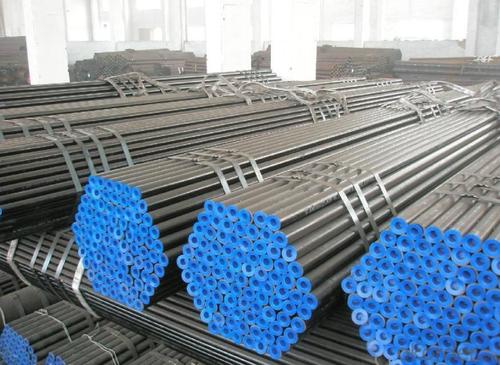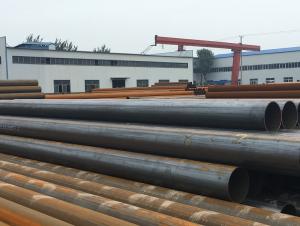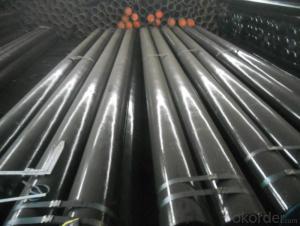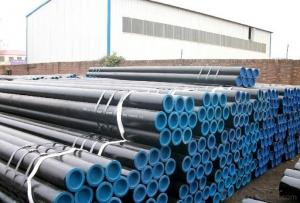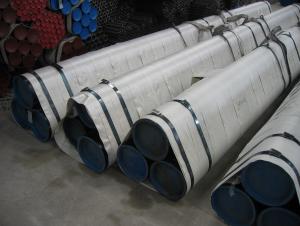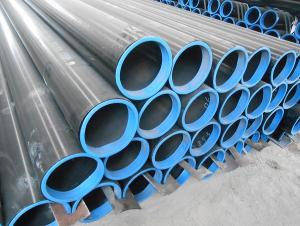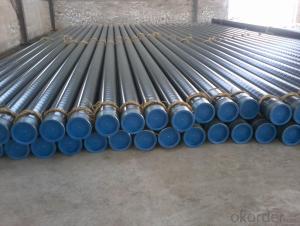Seamless Steel pipe hot Rolled/Cold Rolled
- Loading Port:
- Tianjin
- Payment Terms:
- TT or LC
- Min Order Qty:
- 25 m.t.
- Supply Capability:
- 8000 m.t./month
OKorder Service Pledge
OKorder Financial Service
You Might Also Like
1、Structure of Seamless steel pipe hot Rolled/Cold Rolled Description:
Seamless pipe is formed by drawing a solid billet over a piercing rod to create the hollow shell. As the manufacturing process does not include any welding, seamless pipes are perceived to be stronger and more reliable. Historically seamless pipe was regarded as withstanding pressure better than other types, and was often more easily available than welded pipe.
2、Main Features of the Seamless steel pipe hot Rolled/Cold Rolled:
• High manufacturing accuracy
• High strength
• Small inertia resistance
• Strong heat dissipation ability
• Good visual effect
• Reasonable price
3、 Seamless steel pipe hot Rolled/Cold Rolled Specification:
Standard | GB, DIN, ASTM |
Grade | 10#-45#, 16Mn |
Thickness | 8 - 33 mm |
Section Shape | Round |
Outer Diameter | 133 - 219 mm |
Place of Origin | Shandong, China (Mainland) |
Secondary Or Not | Non-secondary |
Application | Hydraulic Pipe |
Technique | Cold Drawn |
Certification | API |
Surface Treatment | factory state or painted black |
Special Pipe | API Pipe |
Alloy Or Not | Non-alloy |
Length | 5-12M |
Outer Diameter | 21.3-610mm |
Grade | 20#, 45#, Q345, API J55, API K55, API L80, API N80, API P110, A53B |
Standard | ASME, ASTM |
1.Material:20#(ASTM A 106/A53 GRB.API5LGRB,GB),45#,16Mn,10#.
2.Specification range:OD:21.3-610mm,WT:6-70mm,length:6-12m or according to the requirement of clients.
3.Excutive standards:GB,ASME API5L.ASTM A 106/A53,Despite of the above standards,we can also supply seamless steel pipe with standard of DIN,JIS,and so on,and also develop new products according to the requirements of our clients!
4.Surface:black lacquered,varnish coating or galvanized.
5.Ends:Beveled or square cut,plastic capped,painted.
6.Packing:bundles wrapped with strong steel strip,seaworthy packing.
4、Seamless steel pipe hot Rolled/Cold Rolled Images:
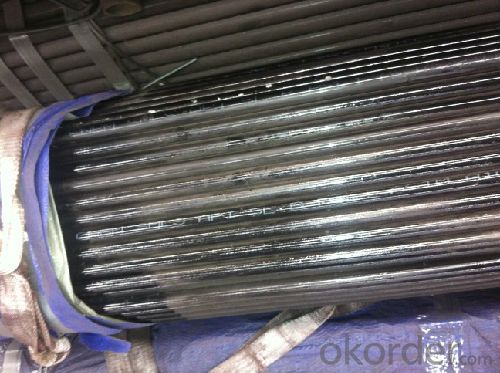
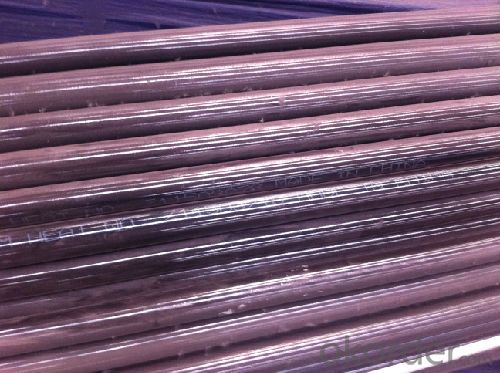
5、FAQ of Seamless steel pipe hot Rolled/Cold Rolled:
①How is the quality of your products?
Our products are manufactured strictly according to national and internaional standard, and we take a test
on every pipe before delivered out. If you want see our quality certifications and all kinds of testing report, please just ask us for it.
Guaranteed: If products’ quality don’t accord to discription as we give or the promise before you place order, we promise 100% refund.
②How about price?
Yes, we are factory and be able to give you lowest price below market one, and we have a policy that “ for saving time and absolutely honest business attitude, we quote as lowest as possible for any customer, and discount can be given according to quantity”,if you like bargain and factory price is not low enough as you think, just don’t waste your time.Please trust the quotation we would give you, it is professional one.
③Why should you chose us?
Chose happens because of quality, then price, We can give you both.Additionally, we can also offer professional products inquiry, products knowledge train(for agents), smooth goods delivery, exellent customer solution proposals.Our service formula: good quality+good price+good service=customer’s trust
SGS test is available, customer inspection before shipping is welcome, third party inspection is no problem.
- Q: DN80 seamless steel tube, what is the standard thickness?
- Commonly used DN80 seamless steel pipe caliber should be 89mm*4mm.
- Q: What are the environmental impacts of steel pipe production?
- The environmental impacts of steel pipe production include the extraction and processing of raw materials, such as iron ore and coal, which contribute to deforestation, habitat destruction, and air and water pollution. The manufacturing process also emits greenhouse gases and other pollutants, contributing to climate change and air pollution. Additionally, the disposal of waste materials and the potential for leaks or spills during transportation can harm ecosystems and water sources.
- Q: Can steel pipes be insulated for thermal efficiency?
- Steel pipes can indeed be insulated to enhance their thermal efficiency. By insulating steel pipes, heat loss or gain can be minimized, depending on the specific purpose. Typically, the insulation material is wrapped around the pipes, creating a protective barrier. This barrier effectively prevents heat transfer between the pipes and the surrounding environment. As a result, the energy required to heat or cool the fluid flowing through the pipes is significantly reduced, leading to improved energy efficiency. This practice is widely employed in industries such as HVAC, oil and gas, and industrial processes, where precise temperature control is crucial. Moreover, insulation also serves to prevent condensation and corrosion on the outer surface of the pipes. All in all, insulating steel pipes is a cost-effective measure that enhances thermal efficiency and reduces energy consumption.
- Q: How are steel pipes used in the manufacturing of appliances?
- Steel pipes are commonly used in the manufacturing of appliances for various purposes such as transporting fluids, gases, and air within the appliance, providing structural support, and acting as conduits for electrical wiring. They are also used for creating ventilation systems and heat transfer mechanisms, ensuring efficient operation and durability of appliances.
- Q: Are steel pipes suitable for pharmaceutical manufacturing facilities?
- Yes, steel pipes are suitable for pharmaceutical manufacturing facilities. Steel pipes are commonly used in pharmaceutical manufacturing due to their excellent corrosion resistance and durability. They can withstand high pressure and temperature conditions, making them ideal for various applications such as transporting fluids, gases, and chemicals within the facility. Additionally, steel pipes can be easily cleaned and sanitized, ensuring the integrity and safety of pharmaceutical products. Furthermore, steel pipes are cost-effective and have a long service life, making them a reliable choice for pharmaceutical manufacturing facilities.
- Q: What are the factors to consider when selecting the right steel pipe for a specific application?
- There are several factors to consider when choosing the appropriate steel pipe for a particular application. These factors encompass: 1. Compatibility with materials: Ensuring that the steel pipe is compatible with the substance it will transport or contain is crucial. Different materials may necessitate specific types of steel pipes to prevent corrosion or contamination. 2. Pressure and temperature requirements: The pressure and temperature conditions that the steel pipe will face should be taken into account. This will determine the necessary thickness and strength of the pipe to ensure it can withstand the intended operating conditions. 3. Size and dimensions: Selecting the size and dimensions of the steel pipe should be based on the flow rate, volume, and available installation space. It is vital to choose a pipe with the appropriate diameter and wall thickness to prevent flow restrictions or leaks. 4. Environmental conditions: The environment in which the steel pipe will be installed must be considered. Factors such as exposure to moisture, chemicals, or extreme temperatures may necessitate the use of specific coatings or materials to enhance the longevity and durability of the pipe. 5. Cost considerations: The cost of the steel pipe and its installation should be taken into account. Striking a balance between desired quality and available budget is essential to ensure the most cost-effective solution. 6. Regulatory compliance: Depending on the application, there may be specific industry regulations or standards that must be adhered to. Choosing a steel pipe that meets these requirements is important to ensure compliance and avoid any legal or safety issues. 7. Maintenance and lifespan: The maintenance requirements and expected lifespan of the steel pipe should also be considered. Some applications may require regular inspections or replacements, while others may require a more durable and long-lasting pipe. By carefully considering these factors, it is possible to select the appropriate steel pipe for a specific application that meets the desired performance, durability, and safety requirements.
- Q: Do steel pipes require maintenance?
- Maintenance is necessary for steel pipes. Despite their durability and long lifespan, steel pipes can still experience wear and tear over time. To ensure optimal performance and extend their lifespan, regular maintenance is crucial. Inspecting the pipes for damage or corrosion is an important part of maintenance. Rust and corrosion can affect steel pipes, especially in high humidity or water-exposed environments. Regular inspections enable early detection of any problems, preventing more extensive damage and costly repairs in the future. Cleaning the pipes is another maintenance task. Over time, debris, sediment, or mineral deposits can accumulate in steel pipes. These build-ups can restrict fluid flow or impact the quality of transported materials. Regular cleaning removes these obstructions and maintains pipe efficiency. Periodic lubrication or coating may be necessary depending on the pipe's use. Lubricants and coatings reduce friction, prevent corrosion, and enhance durability. During maintenance, these can be applied to ensure smooth functioning and resistance to corrosion. In summary, regular maintenance is vital for steel pipes to maximize performance, prevent damage, and extend their lifespan. By investing time and effort in maintenance, potential issues can be identified and addressed early on, ultimately saving time and money in the long term.
- Q: What is PE coated steel pipe? Seek explanation
- PE coating on the inner wall of steel pipe steel pipe is covered with a layer of polyethylene plastic polymer, PE, polyethylene (Polyethylene of raised temperature is the abbreviation of resistance English), the scope of application of the general PE pipe water supply pipe to a temperature below 40 DEG C, cannot be used for hot water transmission pipeline.
- Q: Can steel pipes be used for underground water wells?
- Yes, steel pipes can be used for underground water wells. Steel pipes are often chosen for their durability and strength, which makes them suitable for withstanding the pressure and weight of the surrounding soil and water. They are commonly used in both residential and industrial applications for drilling and constructing water wells. However, it is important to consider certain factors such as the type and quality of the steel, as well as the presence of corrosive elements in the water, to ensure the longevity and reliability of the well system. Additionally, proper insulation and coating may be required to prevent corrosion and contamination of the underground water source.
- Q: How are steel pipes used in the manufacturing of power distribution systems?
- Steel pipes are commonly used in the manufacturing of power distribution systems as they provide a reliable and durable solution for transporting and protecting electrical cables. They are used to create conduits that house the cables, ensuring safe and efficient transmission of electricity throughout the system. Steel pipes also offer resistance to corrosion, fire, and extreme weather conditions, making them a suitable choice for power distribution systems.
Send your message to us
Seamless Steel pipe hot Rolled/Cold Rolled
- Loading Port:
- Tianjin
- Payment Terms:
- TT or LC
- Min Order Qty:
- 25 m.t.
- Supply Capability:
- 8000 m.t./month
OKorder Service Pledge
OKorder Financial Service
Similar products
Hot products
Hot Searches
Related keywords


